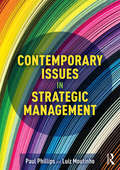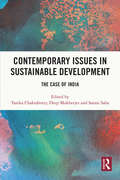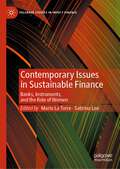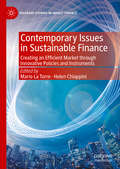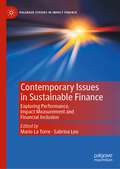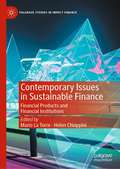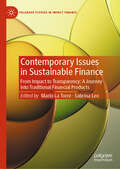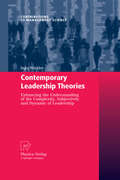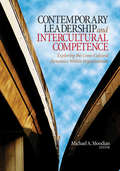- Table View
- List View
Contemporary Issues in Sport Management: A Critical Introduction
by Terri Byers'Contemporary Issues in Sport Management presents an extensive array of absorbing contemporary issues relevant to managing sport. Internationally recognised scholars have contributed thought-provoking chapters on current global and local issues that are challenging traditional ways of thinking about and delivering sport. This exciting new book is rich in theory and stimulates readers to really think through the associated implications for sport management practice.' -Tracy Taylor, Professor and Deputy Dean, University of Technology Sydney Business School Contemporary Issues in Sports Management offers a rich and dynamic introduction to the management of sport. An essential companion for all students embarking on a sports management course or module, it draws on research expertise from around the world and integrates these perspectives into engaging and accessible chapters. This book offers: Contemporary and international case studies followed by 'Tools for analysis' so students can put the methodology into practice. A range of pedagogical features including learning objectives, learning outcomes and short 'Thinking points' Useful websites and further reading at the end of each chapter A discussion of up-to-date issues including corruption in sport, sport policy, doping, athlete transgressions and much more. This book will lead students on a comprehensive exploration of global, national issues, and organizational issues in sport management. The authors encourage critical thought, investigation and the questioning of current practice in order to improve the leadership and management of sport in today's society. Ideal for Undergraduate students of sport management, sport business, sport policy, sport marketing and sport development.
Contemporary Issues in Strategic Management
by Luiz Moutinho Paul PhillipsTraditional narratives on strategic management no longer fulfil the needs of students, practitioners, consultants and business owners operating within contemporary society. This textbook provides a differentiated approach to the topic, highlighting the dichotomy between theory and practice, and guiding readers towards an understanding of the future of strategic management. Moving beyond the short-sighted goal of profit maximization, Contemporary Issues in Strategic Management shines a light on measures that really matter, such as value. A wealth of global examples provide an illustration of competitive advantage from market-based and state-based perspectives, giving an insight into the activities that lead to the formation of successful and unsuccessful strategies. Written by two distinguished scholars in the field, this global textbook is essential reading for postgraduate students of strategic management worldwide.
Contemporary Issues in Sustainable Development: The Case of India
by Tanika Chakraborty Daeep Mukherjee Sarani SahaThis book analyzes different perspectives around sustainable development, risk management and managing demand across various sectors in India. Diverse theories and analytical methods from various disciplines, as well as case studies, are brought together to present an in-depth study. The book discusses the challenges of achieving sustainability, the role of quantitative research to assess current scenarios, and the role of policy making to bring improvements in the Indian context. It examines the socioeconomic ways of pursuing sustainable development in the areas of agriculture, climate change and energy; the environment and natural resources; health and society. It also analyzes important quantitative models for sustainability policy analysis and provides case studies to understand the practical implementations of the models. This book will be a great reference manual that covers a whole gamut of analytical techniques that are useful for students, research scholars and practitioners of economics, environmental studies, development studies, sociology, South Asian studies and public policy, among others.
Contemporary Issues in Sustainable Finance: Banks, Instruments, and the Role of Women (Palgrave Studies in Impact Finance)
by Mario La Torre Sabrina LeoThis book showcases cutting-edge research on a variety of themes related to sustainable and impact investments. It sheds light, theoretically and empirically, on three particular contemporary challenges for sustainable finance: shifts in banking towards prioritizing sustainable growth, the rapid evolution of sustainable bonds, and the growing role of women in sustainable finance. The first section of the book explores the benefits for banks and the financial industry from integrating sustainable finance into their business processes, as well as the role banks play in allocating resources towards a decarbonized economy. Chapters discuss risk reduction and the reputational boost for banks, as well as assessing the impact of new regulation frameworks targeted at sustainable growth. The second part examines sustainable financial products, with a focus on green bonds, and discusses how they can be used for long-term financing for sustainable projects, encourage accountability and transparency, stimulate market growth, manage risk, and benefit the environment and society more broadly. The final section of the book takes an internal look at sustainable finance and addresses the significant role that women play, helping to develop more creative and practical solutions, serving as role models, and increasing involvement in the financial sector. Combining academic analysis with practical examples from the industry, this book will be useful to students and researchers working in sustainable finance, banking, and financial regulation.
Contemporary Issues in Sustainable Finance: Creating an Efficient Market through Innovative Policies and Instruments (Palgrave Studies in Impact Finance)
by Mario La Torre Helen ChiappiniSustainable investments, although not yet working under a comprehensive regulatory framework, represent a growing, worldwide phenomenon. Such growth reflects the renewed public and private interest in environmental issues such as climate change, poverty and financial inclusion, as well as growing support from conscious investors looking to finance environmental and social initiatives. However, despite the interest that sustainable investments are gaining among governors, investors and practitioners, important challenges remain that must be addressed. Comprising a collection of research presented at the 2nd Social Impact Investments International Conference, this contributed volume offers a global analysis of the current state of the sustainable finance sector, proposing solutions to challenging obstacles and exploring topics including impact investing, social impact bonds and green banking. Providing real-life case studies from Europe, Latin America and Africa, this book is an insightful and timely read for scholars interested in sustainable finance, social impact investing, development finance and alternative finance.
Contemporary Issues in Sustainable Finance: Exploring Performance, Impact Measurement and Financial Inclusion (Palgrave Studies in Impact Finance)
by Mario La Torre Sabrina LeoThe notion of sustainable development is applied to financial activities through sustainable finance. As a result, sustainable finance attempts to produce long-term value by allocating capital to projects that, in addition to providing economic benefits, are furthermore beneficial to society and do not burden the environment.This book sheds light on contemporary challenges in sustainable finance, addressing two key perspectives: measurement and performance, and products and business models. In particular, the volume examines theoretically and empirically the relations between business models and non-financial impact, both environmental and social; as for the social goals, a special focus of the book is dedicated to the gender gap.
Contemporary Issues in Sustainable Finance: Financial Products and Financial Institutions (Palgrave Studies in Impact Finance)
by Mario La Torre Helen ChiappiniThis book sheds light on current issues in sustainable finance through an in-depth analysis and discussion of relevant sustainable products and sustainable initiatives of several financial institutions. This edited collection critically presents and discusses several relevant theoretical issues, case studies of innovative financial products and sustainable institutions, as well as empirically investigates issues related to both financial and social performance. The book focuses on several innovative products across the sustainable finance ecosystem, including social impact bonds, crowdfunding and green bonds. Similarly, the book spotlights the sustainable investment strategies of institutions ranging from family foundations to asset managers.
Contemporary Issues in Sustainable Finance: From Impact to Transparency: a journey into traditional financial products (Palgrave Studies in Impact Finance)
by Mario La Torre Sabrina LeoThis book explores the evolving landscape of sustainable finance across various sectors and delves into critical topics ranging from the integration of Environmental, Social, and Governance (ESG) criteria in investment decisions to the transformative potential of blockchain technology. In more detail, three main perspectives are addressed: the issue of materiality and integrating ESG factors in the firm business model; the trends in the debt and credit markets; and the role of governance and transparency. In nine chapters, the book covers both a theoretical approach as well as empirical analysis, providing essential perspectives for regulators, investors, practitioners, and scholars navigating the complex landscape of sustainable finance.
Contemporary Issues in Taxation Research
by Andy LymerThis book is based upon papers presented at the 10th Annual Conference of the Tax Research Network held at the University of Birmingham, United Kingdom, in September 2000. The book covers four discrete areas namely compliance, e-commerce and taxation, international taxation and taxation within the European Union, and value added tax, and focuses within those areas on issues of topical and continuing interest. In an introductory chapter, the editors provide an overview of the subject matter of each of the substantive chapters (of which there are eleven). They conclude by seeking to extrapolate from those chapters, notwithstanding their diversity, various matters of wider and contemporary import to taxation. The treatment of the material in this book by scholars from various academic disciplines and with differing geographical perspectives also gives distinct and instructive insights into widely recognised and enduring taxation problems within the above-mentioned subject areas. Further, an appreciation and understanding of the multi-faceted approaches which may be adopted for problem solving, and which are evident in this book, can only enhance the prospects of the ultimate resolution of these problems.
Contemporary Issues in Work and Organisations: Actors and Institutions
by Russell D. Lansbury Anya Johnson Diane Van Den BroekIn a complex and interconnected world, work and organisations are rapidly changing. This book addresses key emerging issues by adopting an imaginative and innovative approach. Its comprehensive coverage on work and organisations aim to: provide understanding of the external forces and institutions that are changing workplaces and organisations; examine how organisations are being managed from within and how this reshapes the way individuals and groups relate to each other, whether they be employers, employees, independent professionals or contingent workers; and integrate these two perspectives to show how both internal and external forces are interconnected and influence each other. By combining theory and case studies, the book illuminates how ideas and concepts can be applied to work and organisations in a variety of contexts.
Contemporary Issues in Work and Organisations: Actors and Institutions
by Russell D. LansburyIn a complex and interconnected world, work and organisations are rapidly changing. This book addresses key emerging issues by adopting an imaginative and innovative approach. Its comprehensive coverage on work and organisations aim to: provide understanding of the external forces and institutions that are changing workplaces and organisations; examine how organisations are being managed from within and how this reshapes the way individuals and groups relate to each other, whether they be employers, employees, independent professionals or contingent workers; and integrate these two perspectives to show how both internal and external forces are interconnected and influence each other. By combining theory and case studies, the book illuminates how ideas and concepts can be applied to work and organisations in a variety of contexts.Chapter 3 of this book is freely available as a downloadable Open Access PDF at http://www.taylorfrancis.com under a Creative Commons [Attribution-Non Commercial-No Derivatives (CC-BY-NC-ND)] 4.0 license.
Contemporary Japanese Economy (Studies In The Modern Japanese Economy Ser.)
by Yutaka Kosai Yoshitaro OginoThis title was first published in 1984. Examining the development of the Japanese economy, this book examines the position of Japan's economy in the world, the internal structure of the large corporation system and the life of the Japanese people.
Contemporary Japanese Restaurant Design
by Nacass Partners Motoko Jitsukawa Cornucopia K K.With evocative texts accompanying stunning photographs, Contemporary Japanese Restaurant Design features 28 of the most cutting-edge dining spaces by the country's leading restaurant designers.
Contemporary Leadership Theories: Enhancing the Understanding of the Complexity, Subjectivity and Dynamic of Leadership (Contributions to Management Science)
by Ingo WinklerThis book provides a comprehensive overview of basic theoretical approaches of today's leadership research. These approaches conceive leadership as an interactive and complex process. They stress the significance of the individual perception for developing and forming leadership relations. Leadership is understood as the product of complex social relationships embedded in the logic and dynamic of the social system. The book discusses theoretical approaches from top leadership journals, but also addresses various alternatives that are suitable to challenge mainstream leadership research. It includes attributional and psychodynamic approaches, charismatic leadership theories, and theoretical concepts that define leader-member relations in terms of exchange relations, as well as leadership under symbolic and political perspectives, in the light of role theory and as a process of social learning.
Contemporary Leadership and Intercultural Competence: Exploring the Cross-Cultural Dynamics Within Organizations
by Michael A. MoodianIn the 21st century, effective leadership can be defined partially as having an ability to adapt and persevere in various cross-cultural environments. Concurrently, in an increasingly globalized environment, leadership requires a keen capacity for understanding and utilizing cultural diversity to build successful organizations. Contemporary Leadership and Intercultural Competence is a breakthrough text that features contributing chapters from some of the world′s leading scholars in the field of cross-cultural leadership. The book comprises 20 chapters that examine the evolving role of cultural diversity in the workplace, the application of cultural comprehension to organizations, and the measurement of various aspects of intercultural competence. Key Features A unique blend of theory and practical applications Several breakthrough, first-of-their-kind chapters on topics such as leadership assessments that measure parameters of intercultural competence, the legal implications of cross-cultural leadership and trade, and the development and implementation of a multicultural vision A plethora of modern examples that provide an accurate description of the contemporary landscape within organizations Invigorating discussion questions at the conclusion of every chapter that engage students Intended Audience Contemporary Leadership and Intercultural Competence is an excellent text for graduate-level courses in Organizational Development, Organizational Behavior, Leadership Theory, Cross-Cultural Management, International Business, Human Resource Management, Educational Leadership, and Public Administration. The book will be of great interest to students, senior managers, cross-cultural management consultants, government leaders, and human resource practitioners.
Contemporary Left-Wing Activism Vol 1: Democracy, Participation and Dissent in a Global Context (Routledge Studies in Radical History and Politics)
by John Michael Roberts Joseph IbrahimWithin many societies across the world, new social and political movements have sprung up that either challenge formal parliamentary structures of democracy and participation, or work within them and, in the process, fundamentally alter the ideological content of democratic potentials. At the same time, some parliamentary political parties have attracted a new type of ‘populist’ political rhetoric and support base. This collection, along with its accompanying volume 2, examines the emergence of, and the connections between, these new types of left-wing democracy and participation. Through an array of examples from different countries, it explains why left-wing activism arises in new and innovative spaces in society and how this joins up with conventional left-wing politics, including parliamentary politics. It demonstrates how these new forms of politics can resonate with the real life experiences of ordinary people and thereby win support for left-wing agendas.
Contemporary Left-Wing Activism Vol 2: Democracy, Participation and Dissent in a Global Context (Routledge Studies in Radical History and Politics)
by John Michael Roberts Joseph IbrahimWithin many societies across the world, new social and political movements have sprung up that either challenge formal parliamentary structures of democracy and participation, or work within them and, in the process, fundamentally alter the ideological content of democratic potentials. At the same time, some parliamentary political parties have attracted a new type of ‘populist’ political rhetoric and support base. This collection, along with its accompanying volume 2, examines the emergence of, and the connections between, these new types of left-wing democracy and participation. Through an array of examples from different countries, it explains why left-wing activism arises in new and innovative spaces in society and how this joins up with conventional left-wing politics, including parliamentary politics. It demonstrates how these new forms of politics can resonate with the real life experiences of ordinary people and thereby win support for left-wing agendas.
Contemporary Library Architecture: A Planning and Design Guide
by Ken WorpoleFocusing on the practical issues which need to be addressed by anyone involved in library design, here Ken Worpole offers his renowned expertise to architects, planners, library professionals, students, local government officers and members interested in creating and sustaining successful library buildings and services. Contemporary Library Architecture: A Planning and Design Guide features: a brief history of library architecture an account of some of the most distinctive new library designs of the 20th & 21st centuries an outline of the process for developing a successful brief and establishing a project management team a delineation of the commissioning process practical advice on how to deal with vital elements such as public accessibility, stock-holding, ICT, back office functions, children’s services, co-location with other services such as learning centres and tourist & information services an sustainability in depth case studies from around the world, including public and academic libraries from the UK, Europe and the US full colour illustrations throughout, showing technical details and photographs. This book is the ultimate guide for anyone approaching library design.
Contemporary Logistics (Eleventh Edition)
by A. Michael Knemeyer Paul R. Murphy Donald WoodExploring modern logistics from a managerial perspective, this leading text brings theory to life with its timely, practical, and thorough coverage of the fundamentals of logistics in today's dynamic global landscape.
Contemporary Logistics in China 2025: Digitalization, E-Commerce, and a Decade of Progress through the Belt and Road Initiative (Current Chinese Economic Report Series)
by Na Li Zhilun Jiao Xiaofan Wu Jianhua Xiao Yu Gong Binglian LiuThis annual report aims to present a timely portrait of the rapid growth of China's logistics market and the status quo of its logistics industry. It provides an in-depth analysis of critical issues involved in the ongoing dynamic and multi-faceted development and serves as a valuable reference resource for interested readers in the academic and professional fields. The book starts with an in-depth overview of the achievements and prospects of China's logistics development in the ten years of the "the Belt and Road Initiative", and then covers macro-factors related to logistics technologies and facilities, region-specific policies and plans, industry-wide transformation in transport, manufacturing, commerce, and agriculture. The book also addresses the current state and challenges of logistics digitization in China and trends from the aspects of continuous promotion, upstream and downstream industry collaboration, intelligent transportation infrastructure, application of logistics big models, and government support. Furthermore, the book offers insights into the development and future prospects of China's cross-border e-commerce logistics. The translation was done with the help of artificial intelligence. A subsequent human revision was done primarily in terms of content.
Contemporary Logistics in China: 20 Years of Progress and Achievement (Current Chinese Economic Report Series)
by Xiang Li Ling Wang Jun Liu Xiaofan Wu Binglian LiuAs with the previous volumes, this book aims to present a timely portrait of the rapid growth of China's logistics market and the status quo of its logistics industry. It provides an in-depth analysis of critical issues involved in the ongoing dynamic and multi-faceted development and serves as a valuable reference resource for interested readers in the academic and professional fields.The opening chapter offers a comprehensive overview of the impressive advancements and accomplishments made by China's logistics industry in the last twenty years, and the following chapters cover macro-factors related to logistics technologies and facilities, region-specific policies and plans, industry-wide transformation in transport, manufacturing, commerce, and agriculture.The book explores two important topics: "Industrial and Supply Chain Safety and Stability" and "Low-Carbon Transformation," highlighting the latest trends and initiatives in China's logistics industry. It also sheds lights on the development and prospects of logistics in the Hainan Free Trade Port, including a detailed analysis of the opportunities and challenges faced by this emerging logistics hub.
Contemporary Logistics in China: Assimilation and Innovation (Current Chinese Economic Report Series)
by Xiang Li Bing-Lian Liu Ling Wang Shao-Ju Lee Ya XuThis book gives a systematic exposition of China's logistics development to the English-reading community. The ultimate goal of the book is to present a timely portrayal of China's logistics market growth and the evolution status of China's logistics industry. Being the fourth volume of the "Contemporary Logistics in China", the book strives to offer in-depth analysis on some hot issues and dilemmas amid the on going dynamic and multi-faceted development and also a source of reference for interested readers in academic and professional fields.
Contemporary Logistics in China: Consolidation and Deepening (Current Chinese Economic Report Series)
by Xiang Li Bing-Lian Liu Ling Wang Shao-Ju Lee Jian-Hua XiaoWhile logistics has caught on as a vital component in China's national development plan, both government agencies at all levels and various types of enterprises have put considerable effort into propelling logistics to a new height Recent logistics developments in China have witnessed a scene of significant boom dotted with few sporadic dips. This book, the third volume in the series on "Contemporary Logistics in China," is a must-read publication, which affords the readers a clearer view of the intrinsic consolidation and increased efforts made amid the recent advancements in China's logistics development. The research findings in this book reflect the expertise and diligence of a team of learned researchers in the highly-regarded Logistics Research Center at Nankai University. The book presents a comprehensive and thorough analysis of the progression and propagation of modern logistics in China, as well as a fresh look at some emerging hot issues with potential bearings on future logistics development. Researchers and practicing professionals alike will find this book an indispensable and timely reference and information resource.
Contemporary Logistics in China: Interconnective Channels and Collaborative Sharing (Current Chinese Economic Report Series)
by Xiang Li Bing-Lian Liu Ling Wang Shao-Ju LeeThis book is the ninth volume in "Contemporary Logistics in China", authored by the researchers in Logistics Research Center at Nankai University. In the spirit of the eight preceding annual volumes, this book carries on the ideal of providing a systematic exposition on the logistics development in China for the English-speaking community at large. Specially, this volume captures China's logistics development at a crucial turning point.This present report consists of nine chapters, organized into three sections. The introductory section, consisting of two chapters, depicts the current development status of the China’s logistics market and the logistics facilities and technology. The second section addresses the characteristics of logistics industries in China including the transportation logistics, the manufacturing logistics, the commerce logistics, and the agricultural products logistics. The final section, consisting of three chapters, discusses some hot logistics topics in China. Chapter 7 describes the emerging service models and innovation of China's highway freight platforms. The next chapter deals with the development and innovation of the Belt and Road cross-border logistics service system. The last chapter presents China's Logistics development and prospect under the context of sharing economy.As with the previous eight volumes, the ultimate aim of this book is to present a timely portrayal of the rapid pace of growth of China’s logistics market and the status of its logistics industry’s evolution. In so doing, the book offers an in-depth analysis of critical issues involved in the ongoing dynamic and multi-faceted development, and provides a valuable reference resource for interested readers in the academic and professional fields.
Contemporary Logistics in China: New Horizon and New Blueprint (Current Chinese Economic Report Series)
by Bing-Lian Liu Ling Wang Shao-Ju Lee Ping Chen Xiao-Mei JiangThis book is the sixth volume in a series entitled "Contemporary Logistics in China," authored by researchers at the Logistics Center, Nankai University. In the spirit of the five preceding volumes, published annually in previous years, this book carries on the ideal of providing a systematic exposition on the development of logistics in China to the English-speaking community. Specifically, this volume captures China's logistics development at a crucial turning point. On the one hand, it echoes the new horizon advocated by the Government's One-Belt-One-Road Initiative for global cooperation; on the other, it resonates with the new blueprint of implementing the main contents of the 13th Five-year Plan on logistics development. Subjects covered include the macro-factors pertaining to logistics development, region-specific plans, industry-wide transformation, globally oriented moves, and current hot topics. Expositions and analyses on these subjects are based on the latest available sources and statistical data. As with the previous volumes, the ultimate aim of this book is to present a timely portrait of the rapid growth of China's logistics market and the status of its logistics industry's evolution. In so doing, this book offers an in-depth analysis of the critical issues and dilemmas amid the ongoing, dynamic and multi-faceted development, and presents a valuable reference source for interested readers in the academic and professional fields.

